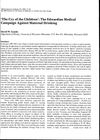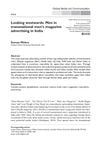 41 citations,
June 2018 in “Medicine Health Care and Philosophy”
41 citations,
June 2018 in “Medicine Health Care and Philosophy” The article suggests using four questions to tell apart necessary medicalization from excessive medicalization, focusing on problem significance, social expectations, medical understanding, and effective resolution.
 38 citations,
November 2000 in “Hastings Center Report”
38 citations,
November 2000 in “Hastings Center Report” The document suggests medicine should integrate biological and cultural factors and focus on holistic, equitable care.
 35 citations,
June 2005 in “The Milbank Quarterly”
35 citations,
June 2005 in “The Milbank Quarterly” The conclusion is that formalizing how past decisions influence current health technology assessments could improve the credibility and defense of coverage decisions.
 29 citations,
March 2008 in “Postcolonial Studies”
29 citations,
March 2008 in “Postcolonial Studies” The article concludes that the global hair trade is exploitative and reflects complex cultural and economic issues.
 27 citations,
March 2013 in “Social Semiotics”
27 citations,
March 2013 in “Social Semiotics” Commercial hair loss websites promote Propecia by making men feel insecure about baldness and suggesting it's a medical issue needing treatment.
 19 citations,
January 2001 in “Dermatology + psychosomatics”
19 citations,
January 2001 in “Dermatology + psychosomatics” The review concluded that male pattern baldness is mostly seen negatively, affecting attractiveness and social appeal.
 16 citations,
July 2020 in “Health and Quality of Life Outcomes”
16 citations,
July 2020 in “Health and Quality of Life Outcomes” Women with Polycystic Ovary Syndrome (PCOS) have a lower health-related quality of life, especially those with an anovulatory phenotype, and may need specific interventions to improve it.
 16 citations,
December 2007 in “Expert Review of Pharmacoeconomics & Outcomes Research”
16 citations,
December 2007 in “Expert Review of Pharmacoeconomics & Outcomes Research” PCOS lowers quality of life, causing issues like obesity, infertility, and menstrual problems.
 14 citations,
February 2000 in “Feminism & Psychology”
14 citations,
February 2000 in “Feminism & Psychology” The entry showed that PCOS negatively affects women's self-image and is worsened by societal expectations, suggesting a need for more feminist attention to the condition.
 13 citations,
March 2018 in “Journal of Sociology”
13 citations,
March 2018 in “Journal of Sociology” The anti-ageing treatment market is growing by exploiting fears of ageing with unproven promises, which could harm public trust and genuine science.
 8 citations,
March 2019 in “Progress in Human Geography”
8 citations,
March 2019 in “Progress in Human Geography” Hair significantly shapes body identity and social interactions, influencing how we perceive and relate to our bodies.
 7 citations,
January 2012 in “Dermatology”
7 citations,
January 2012 in “Dermatology” Most hospitalized internal medicine patients have undiagnosed skin problems and want them treated.
 7 citations,
September 1991 in “Journal of Advertising”
7 citations,
September 1991 in “Journal of Advertising” More profitable TV stations have stricter ad approval rules, and bigger stations are generally stricter too.
 6 citations,
August 2016 in “Journal of women & aging”
6 citations,
August 2016 in “Journal of women & aging” Older women reported negative physical and psychological effects from Botox and facial fillers, feeling neglected by the medical system.
 6 citations,
March 1984 in “British journal of addiction”
6 citations,
March 1984 in “British journal of addiction” The Edwardian medical campaign linked maternal drinking to infant mortality and national decline, influencing hygiene education and leading to a ban on children under 14 from pubs.
 5 citations,
December 2011 in “InTech eBooks”
5 citations,
December 2011 in “InTech eBooks” Eat antioxidant-rich foods, reduce fast food, and explore various treatments for vitiligo.
 3 citations,
July 1997 in “Current problems in dermatology”
3 citations,
July 1997 in “Current problems in dermatology” Hair restoration surgery has evolved over time, with a focus on natural-looking results and managing patient expectations, while also considering potential complications and the lifelong progression of male pattern baldness.
 2 citations,
September 2019 in “South Asian research journal of pharmaceutical sciences”
2 citations,
September 2019 in “South Asian research journal of pharmaceutical sciences” Heavy metals in personal care products can cause serious health issues like cancer and hair loss.
 2 citations,
October 2017 in “Global Media and Communication”
2 citations,
October 2017 in “Global Media and Communication” The conclusion is that top men's magazines in India promote Western ideals of masculinity, favoring fair-skinned, youthful, and Western Caucasian men.
 2 citations,
October 2004 in “Drug Information Journal”
2 citations,
October 2004 in “Drug Information Journal” The conclusion is that combining social and cultural factors with pharmaceutical research could improve our understanding of how drugs work.
 2 citations,
January 1908 in “Journal of the American Medical Association”
2 citations,
January 1908 in “Journal of the American Medical Association” Fear of hair-related issues causes significant mental distress, especially in high-stress women.
 1 citations,
November 2019 in “Actas Dermo-Sifiliográficas”
1 citations,
November 2019 in “Actas Dermo-Sifiliográficas” The Spanish Hair-Specific Skindex-29 questionnaire effectively measures the quality of life impact of hair loss in Spanish-speaking women.
 1 citations,
January 2018 in “Journal of clinical & experimental dermatology research”
1 citations,
January 2018 in “Journal of clinical & experimental dermatology research” The study found no link between vitamin D deficiency and psoriasis but suggests more research is needed.
 1 citations,
August 2017 in “Semiotica”
1 citations,
August 2017 in “Semiotica” The paper concludes that breast cancer treatment involves complex interactions between medical symptoms, patient experiences, and commercial influences, requiring a holistic approach.
 November 2024 in “Journal of Scientific Agriculture”
November 2024 in “Journal of Scientific Agriculture” Silk proteins are great for cosmetics because they protect and improve skin and hair while being eco-friendly.
 January 2024 in “Wiadomości Lekarskie”
January 2024 in “Wiadomości Lekarskie” Robotic hair transplantation with AI offers more reliable, precise, and efficient hair restoration.
 November 2023 in “International Journal of Advanced Research in Science, Communication and Technology”
November 2023 in “International Journal of Advanced Research in Science, Communication and Technology” The herbal hair oil was more effective at reducing hair fall than coconut oil.
 November 2023 in “Martor”
November 2023 in “Martor” People still turn to witchcraft for help with modern problems despite technological advances.

The conference emphasized innovative solutions for global challenges, including disaster architecture, education, health, and economic impacts.

Continuous research and innovative strategies are essential for sustainable development.





























